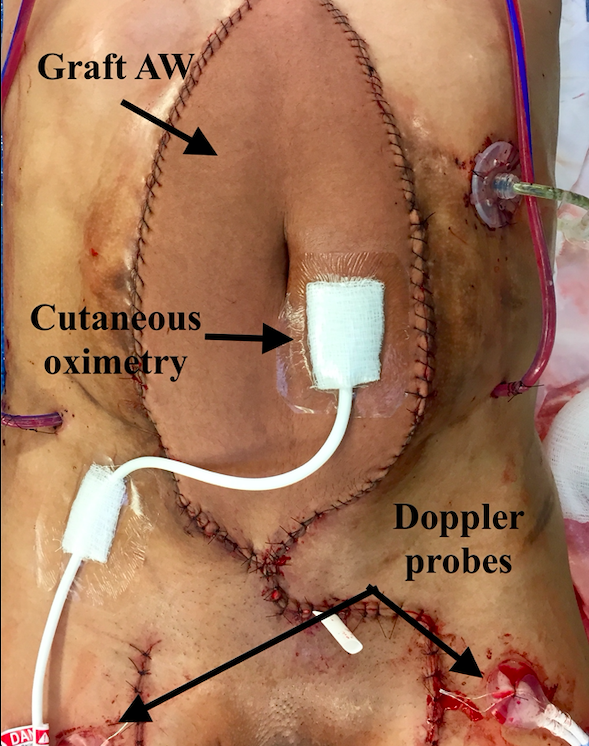Challenges to Inpatient Management Post Abdominal Wall Transplant (AWT) – From App’s Perspective
Duke University hospital, Durham, NC
Meeting: 2019 American Transplant Congress
Abstract number: D405
Keywords: Intestinal transplantation, Monitoring, Surgical complications
Session Information
Session Name: Poster Session D: Late Breaking
Session Type: Poster Session
Date: Tuesday, June 4, 2019
Session Time: 6:00pm-7:00pm
 Presentation Time: 6:00pm-7:00pm
Presentation Time: 6:00pm-7:00pm
Location: Hall C & D
*Purpose: To highlight the unique features of caring for an AWT recipient and identify areas of improvement for future cases
*Methods: AWT is an innovative adjunct to intestinal transplantation (IT) in patients with intestinal failure (IF) – done to address non-reconstructable abdominal wall (AW) defects. As less than 30 AWTs have been done, there is little data on challenges in postop management. At Duke, we recently performed the state’s first AWT and his case was reviewed to improve management of future cases.
*Results: 37 y/o male with history of extensive bowel resections due to adhesions progressed to IF with damage to AW from recurrent enteric fistulas. He had multiple admissions for TPN catheter related sepsis and was listed for combined IT-AWT that was successfully performed in October 2018. The AWT was vascularized with bilateral anastomosis to femoral vessels, and while intestinal stoma is created with IT for ease of bowel biopsy, this was not done to avoid stoma on the AWT. Some of the specific challenges in the postop care included: a) monitoring vascularity of the AWT with cutaneous pulse oximetry & continuous doppler probes ($$graphic1); b) physical limitations related to bed rest for AWT healing; c) clinical monitoring of rejection by visual appearance of AWT and stool volume for IT; d) ensuring compliance with dietitian recommendation to avoid high sugar & lactose containing food; e) providing psychosocial support and privacy to patient/family during this emotionally challenging phase that has garnered intense public attention. The patient had one reoperation to address lymph leak in the groin and had intense pruritus in the early postop period related to narcotics.
*Conclusions: During his hospital stay, the APPs played a crucial role as the nodal point of communication between Transplant and various critical multidisciplinary team. For example, the weekly/clinically driven graft biopsies required coordination of Transplant, Hepatology, Plastic Surgery, and Endoscopy for safe graft monitoring. Furthermore, with minimal IT-AWT experience, education on doppler probes and monitoring for signs of rejection without a stoma had to be completed to ensure graft stability. As AWT evolves in the field of Transplant, it is imperative to implement more education and guidelines (such as bedside graft monitoring protocols or AWT specific diet) to advance the quality of postop care. While multidisciplinary care continues to be encouraged, future research must be done to review the various management methods of AWT to develop standardized care guidelines.
To cite this abstract in AMA style:
Hattori K, Sudan D, Ravindra K. Challenges to Inpatient Management Post Abdominal Wall Transplant (AWT) – From App’s Perspective [abstract]. Am J Transplant. 2019; 19 (suppl 3). https://atcmeetingabstracts.com/abstract/challenges-to-inpatient-management-post-abdominal-wall-transplant-awt-from-apps-perspective/. Accessed July 12, 2025.« Back to 2019 American Transplant Congress

